Nov 23, 2024 – Second Day of Kimjang
Good morning. A new day has dawned at the Dubuk Jungto Retreat Center. Today is the second day of Kimjang.
After completing the early morning practice and meditation, the Kimjang effort began at 6 AM. Despite the cold weather with temperatures dropping to 1°C, but everyone was energized, cheerful, and divided up the tasks.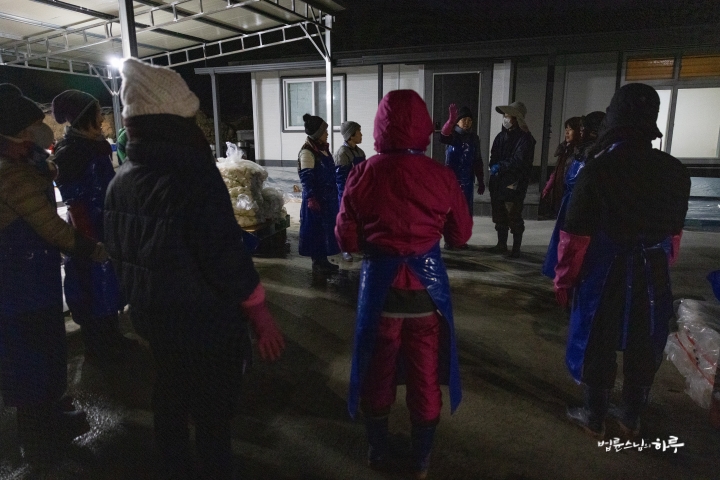
“This morning, we’ll take the salted napa cabbage out of the brine, stack it neatly, and drain the water. We need two volunteers to get into the large tub.”
Overnight, 1,300 heads of napa cabbage were salted.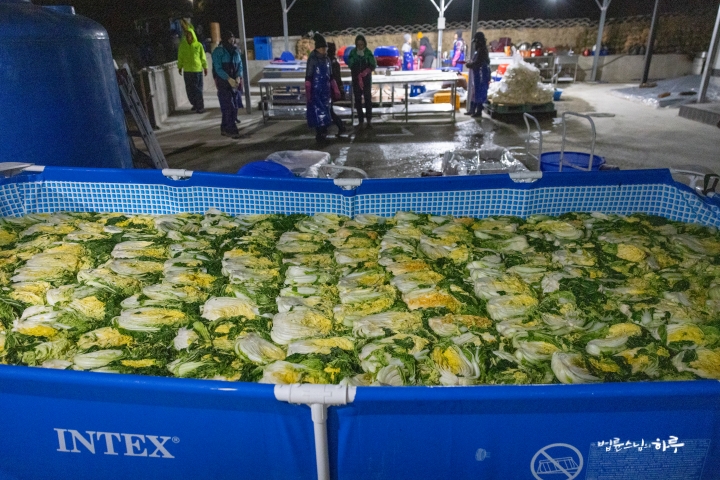
Two people wearing full-body boots entered the large tub to retrieve the kimchi cabbage. Everyone eagerly anticipated whether this new method had properly salted the cabbage as they began lifting it out. When placed on the three-tiered wooden box connected to a slide, the kimchi cabbage slid down and splashed into the water.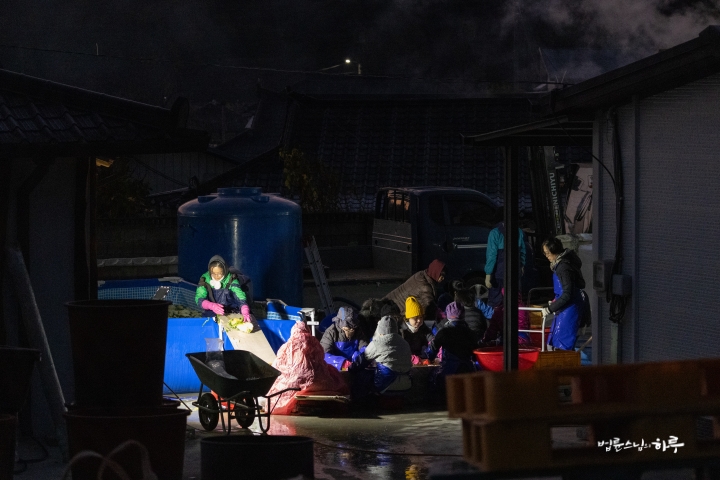
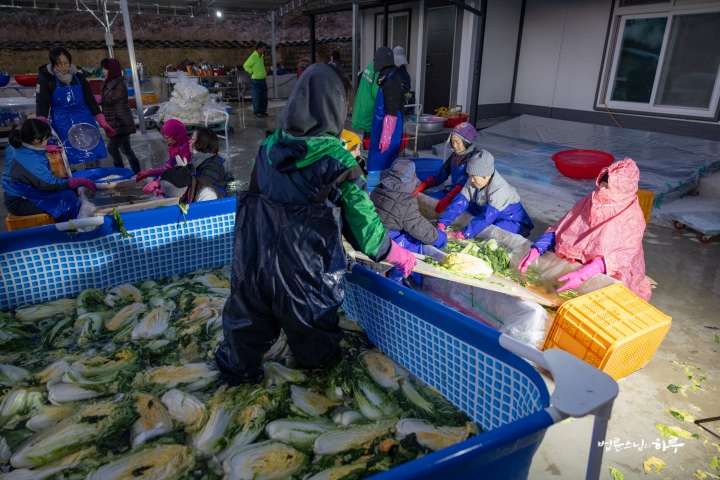
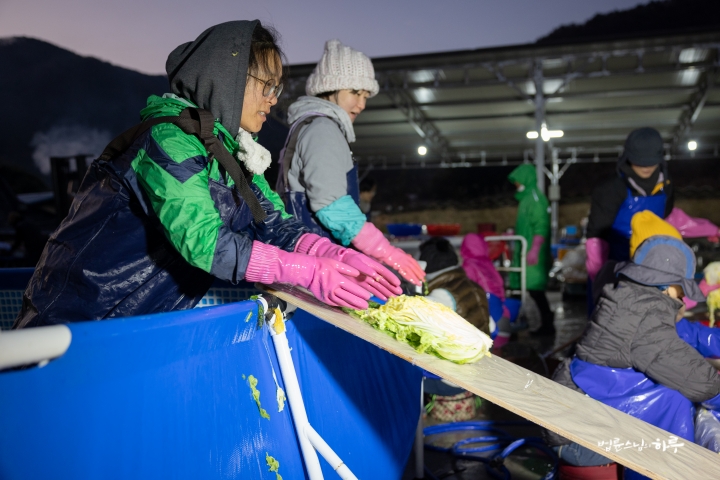
“Kimchi cabbage coming down!”
The kimchi cabbage was thoroughly washed on both sides in three stages. Gradually, the morning light began to break.
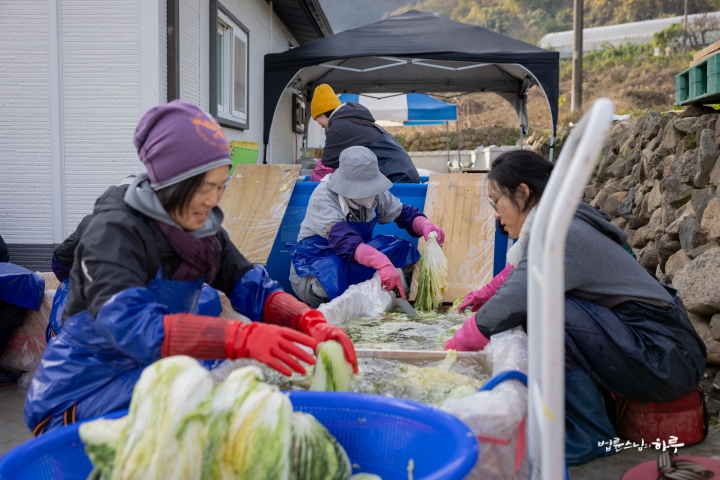
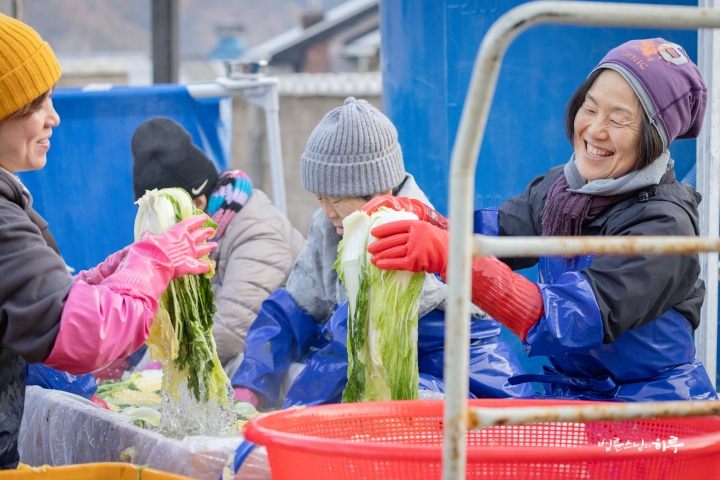
As they lifted the kimchi cabbage, they noticed some that had not yet fully solted down. Sunim alerted everyone.

“Many are not fully salted yet. Please select only the ones that are fully salted down.”
Sunim went to the large tub and selected only the fully salted kimchi cabbage to slide down. The kimchi cabbage that was not fully salted was left in the tub. Others continued washing the kimchi cabbage.
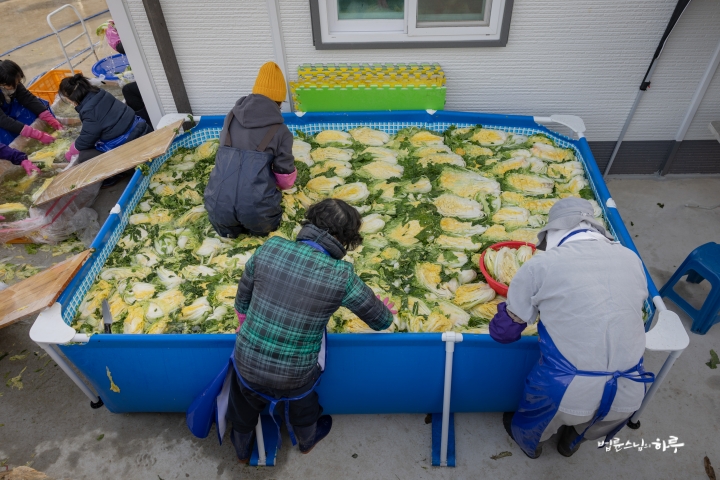
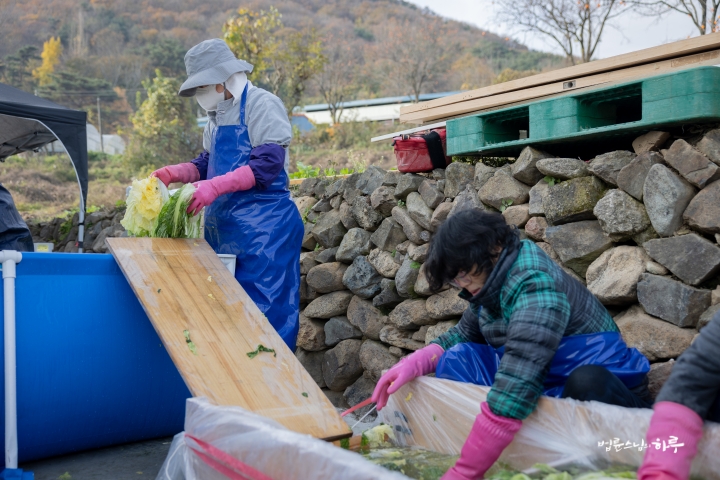
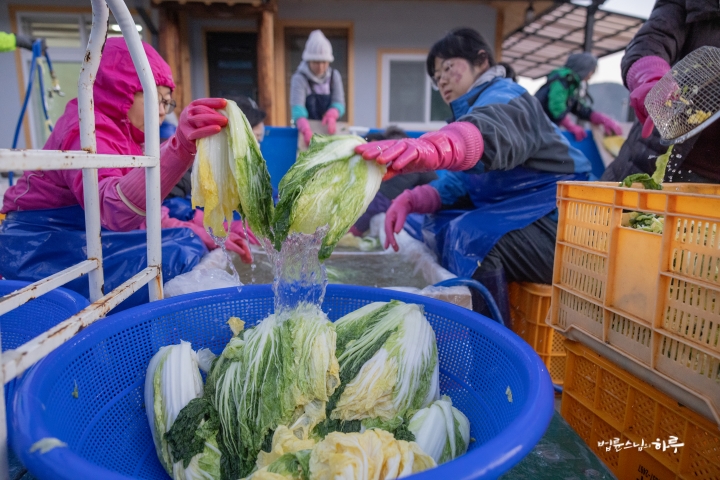
As the work pace quickened, the thoroughly washed kimchi cabbage was rapidly stacked. The kimchi cabbage was piled on a sloped area to allow the water to drain.
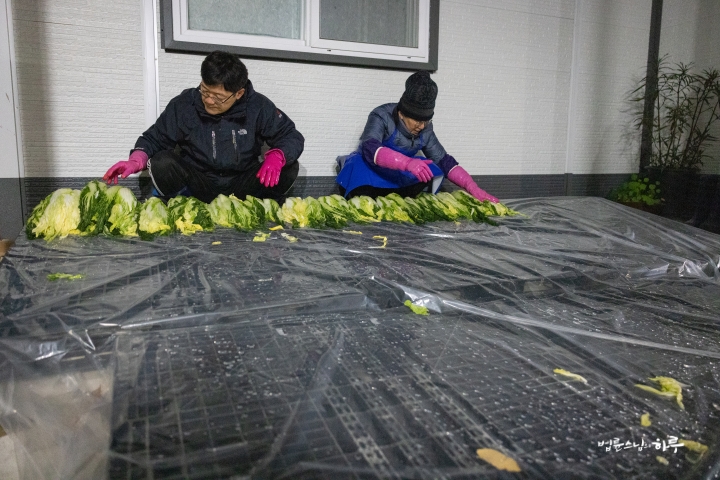
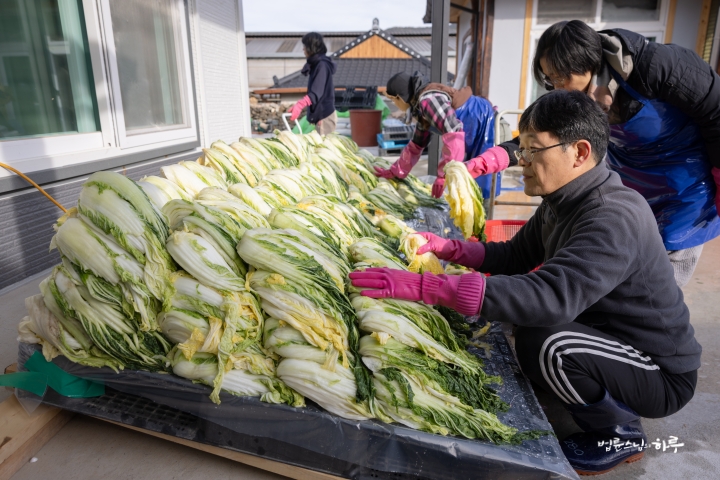
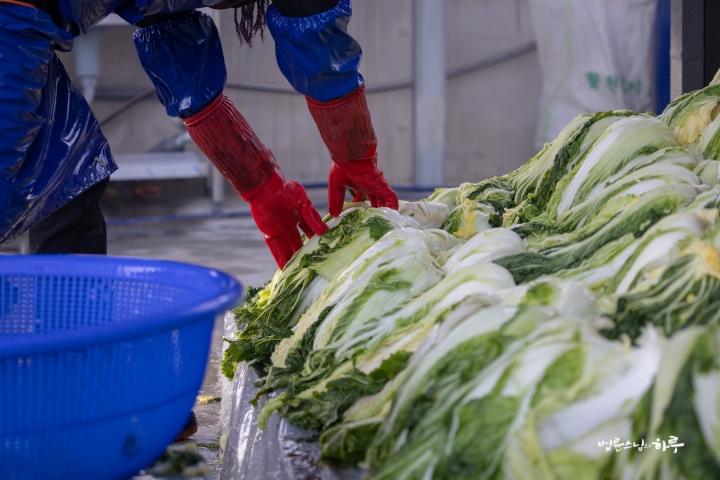
Simultaneously, in one corner of the yard, radishes were being cut to be placed between the cabbage kimchi, and vegetables for the kimchi seasoning were being chopped.
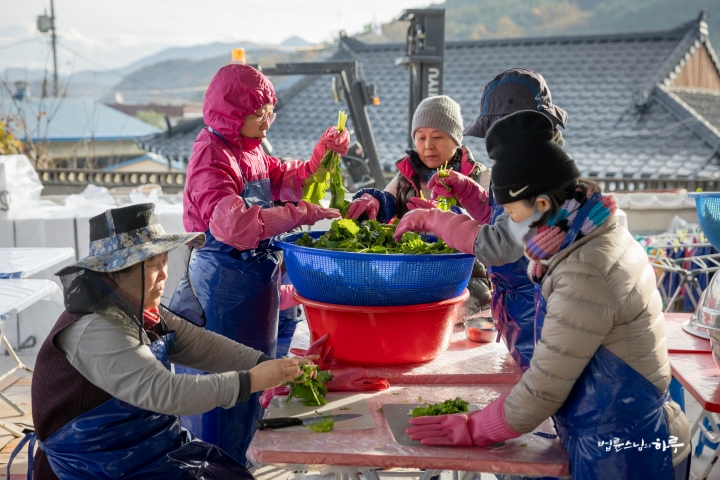
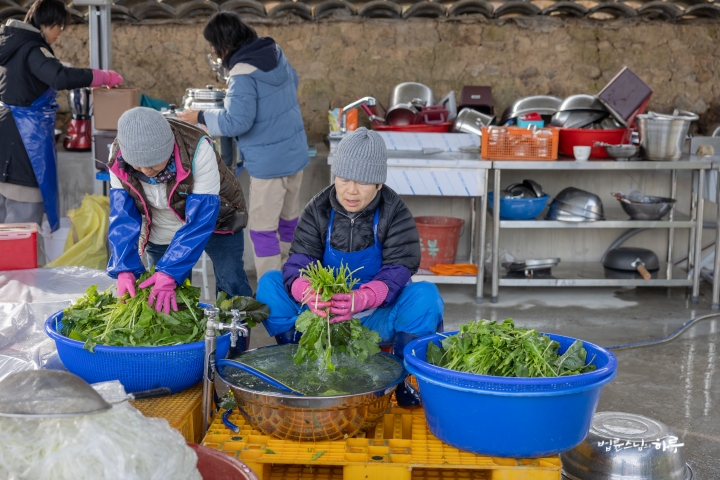
After focusing on washing kimchi cabbage all morning, all the kimchi cabbage was washed except for those that were not fully salted.
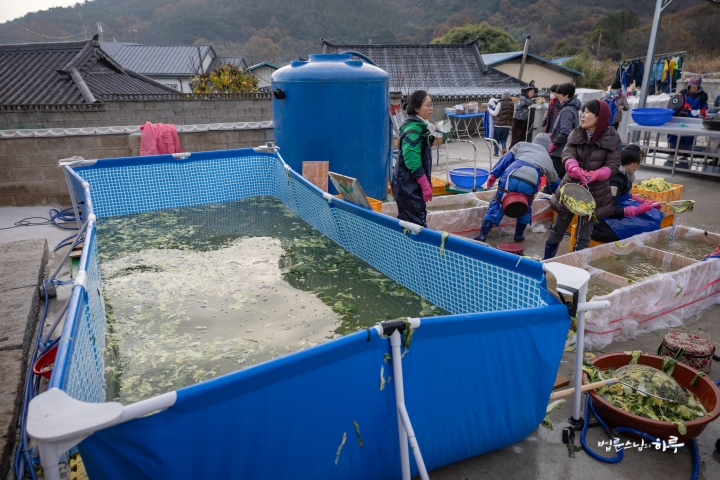
The insufficiently salted kimchi cabbage was placed back in the brine and pressed down with heavy water containers. More salt was added.
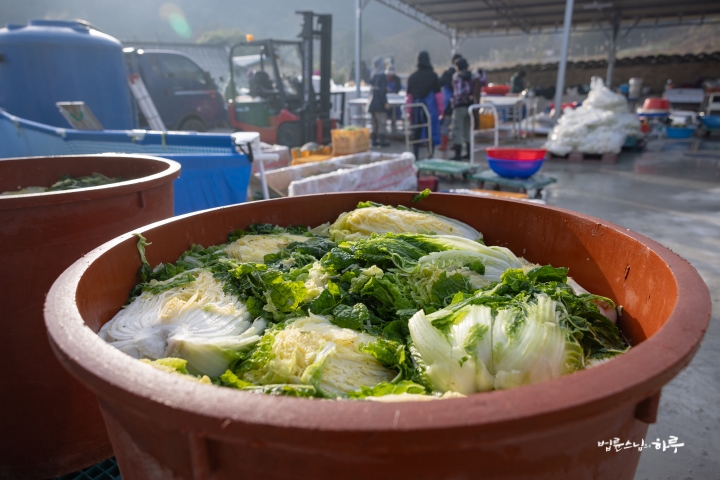
“Let’s leave it a bit longer until it’s fully salted.”
While waiting for the water to drain from the cabbage, everyone worked together to prepare the kimchi seasoning. All the seasoning ingredients were mixed thoroughly with various vegetables in large basins.
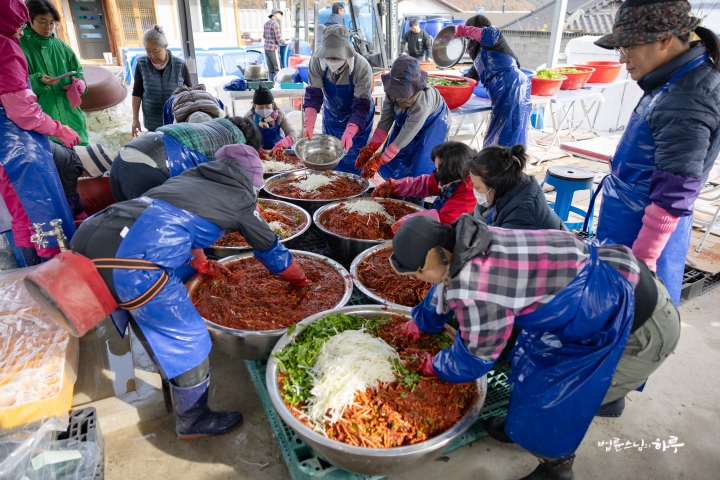

The task of mixing the cabbage with the kimchi seasoning was scheduled for the afternoon, concluding the morning’s work.
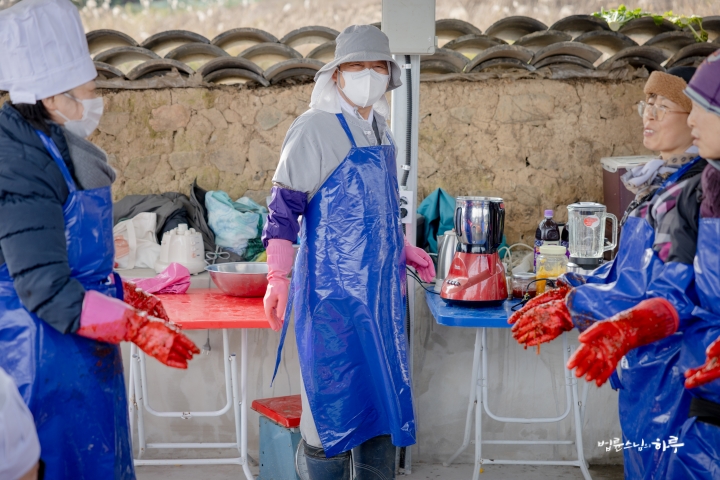
“Good job, everyone. Let’s continue after lunch.”
Everyone took a short break during lunch.
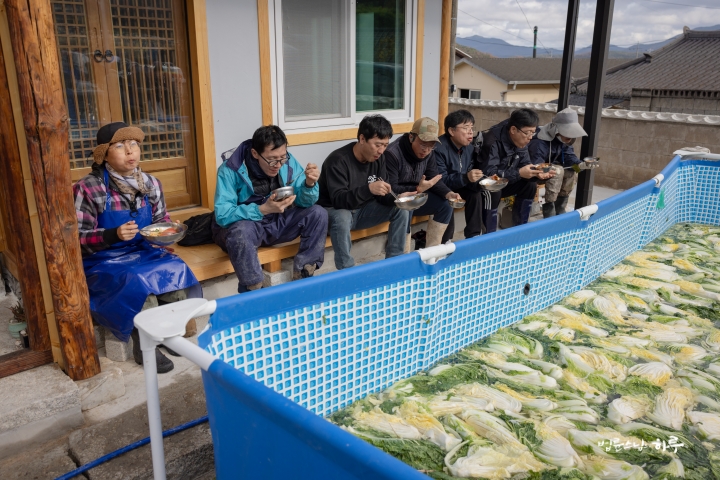

In the afternoon, they began by washing the cabbage that had been re-soaked due to insufficient salting. Everyone moved their hands quickly and efficiently.
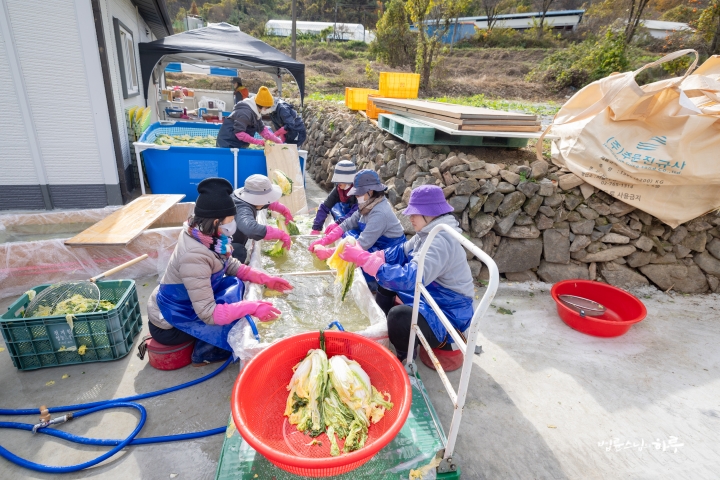
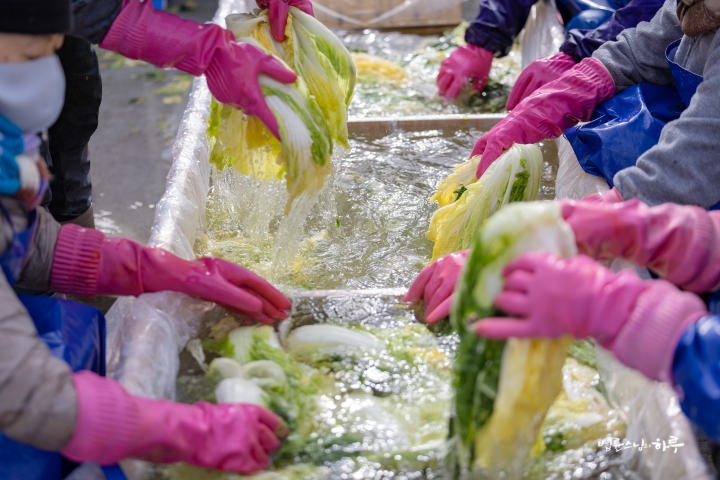
Two mountains of salted cabbage were formed.
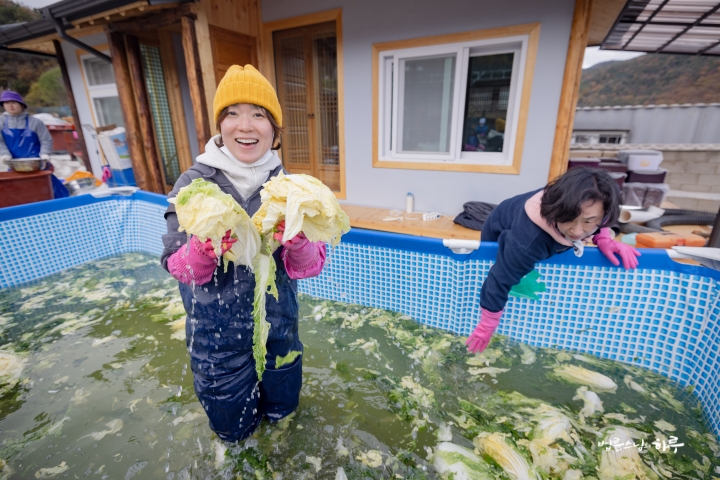
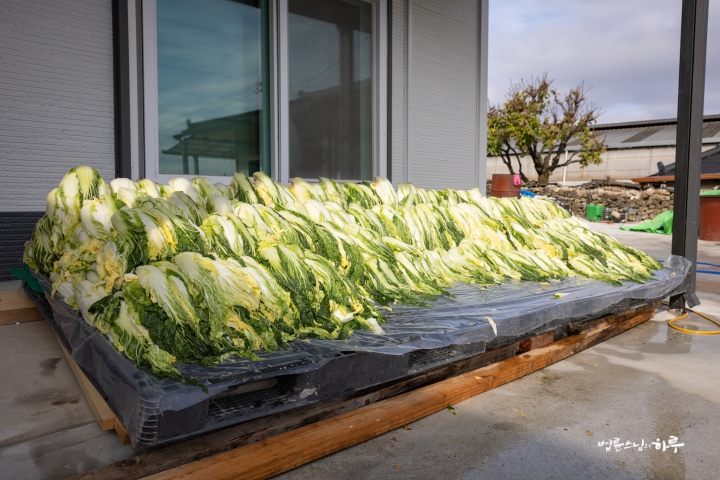
The brine used for salting the kimchi cabbage was transferred to containers for use in the fields.

Next, they began the main task of mixing the kimchi seasoning with the cabbage. This is the most time-consuming part of the process.
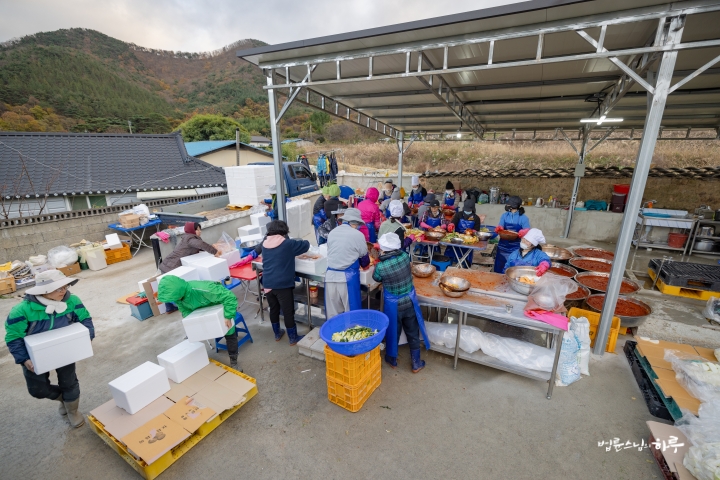
With headscarves tied tightly and faces covered with masks, the kimchi factory was in full operation.
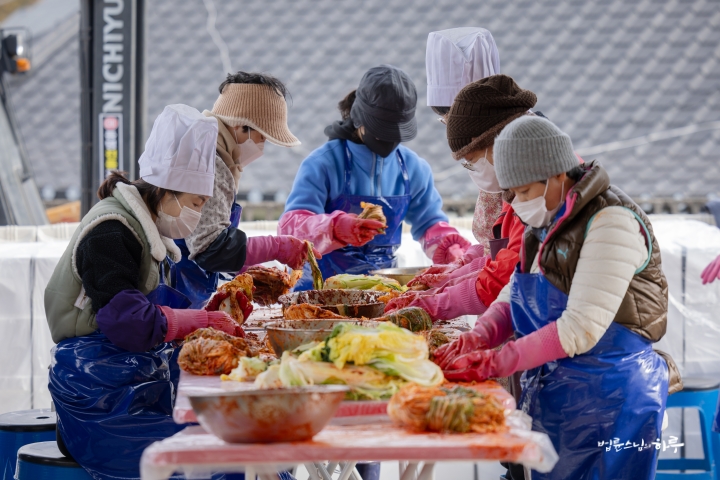
On one side, the base of the salted cabbage was diligently trimmed, while trainees delivered the prepared cabbage to the shelves. Even while trimming the bases, if insufficiently salted cabbage was found, it was set aside to be re-soaked in brine.
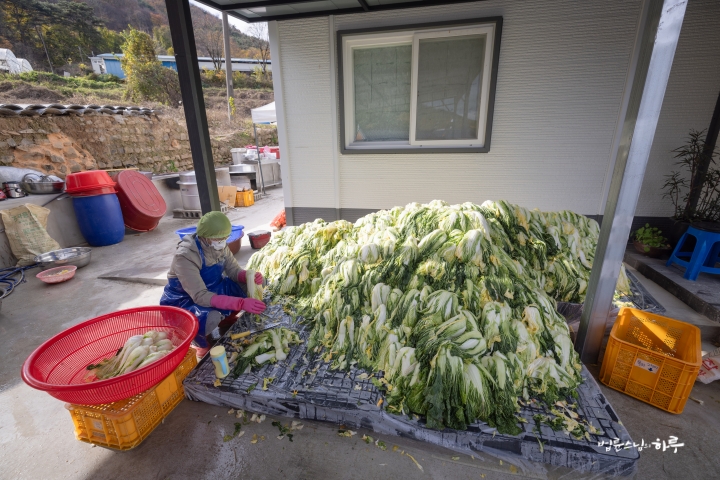
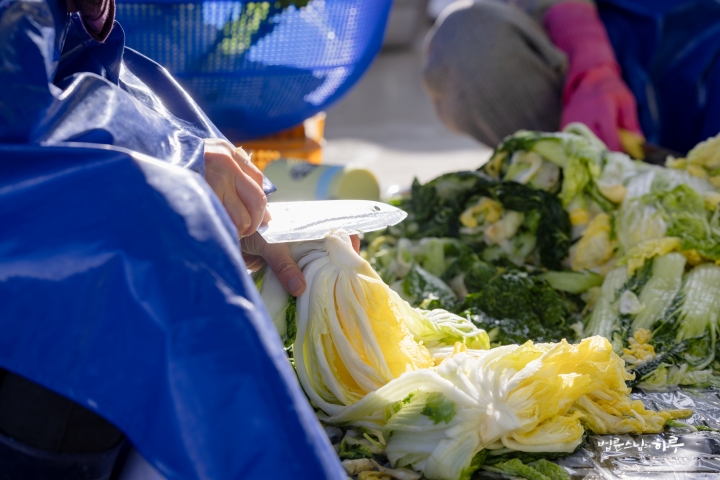
The trainees responsible for mixing rubbed the kimchi seasoning all over the cabbage to ensure even coloring, then filled the spaces between the leaves with more seasoning. Finally, they wrapped the outer leaves around to prevent the seasoning from falling out.
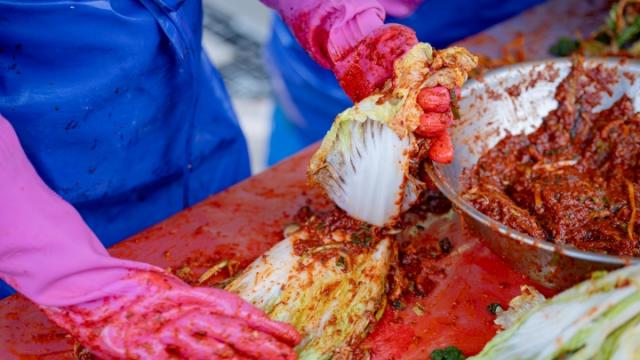

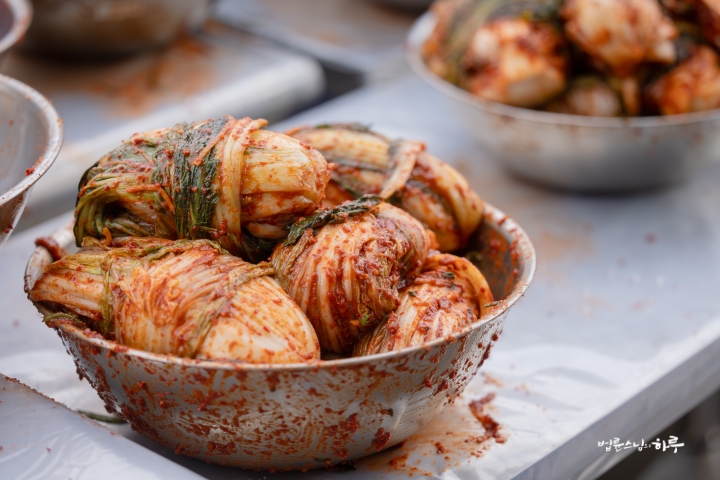
At first, the process was slow due to inexperience, but as they gained proficiency, the kimchi production speed increased. Sunim took charge of packing the well-made kimchi into boxes.
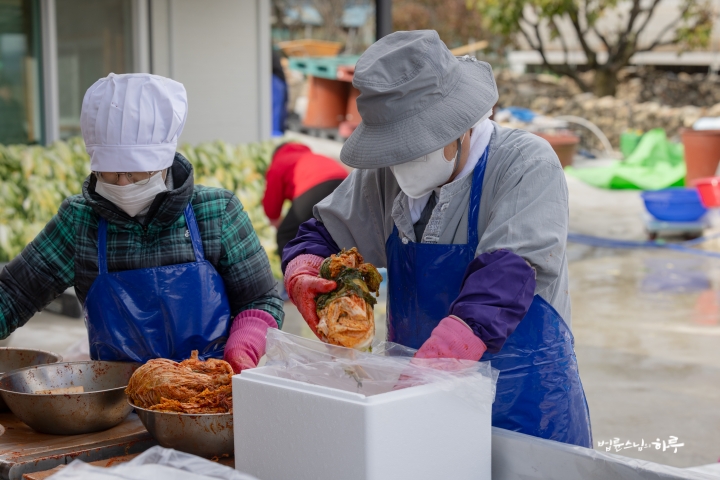
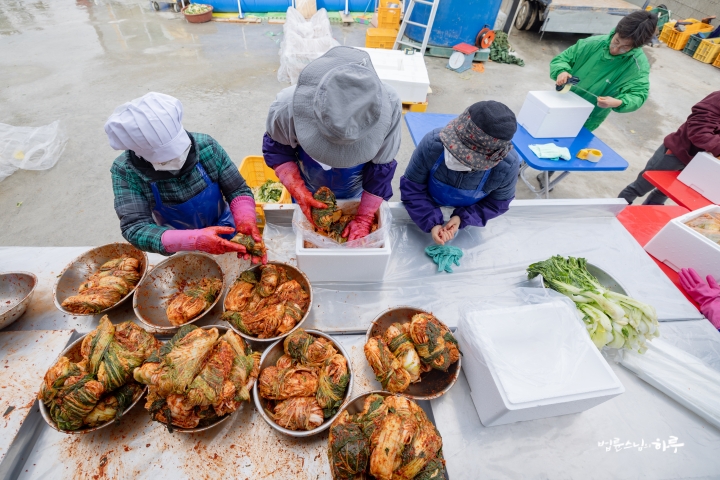
“Bring the kimchi here!”
When Sunim called out, someone rushed over.
“Yes, kimchi coming!”
They packed the boxes with alternating layers of kimchi and radish.
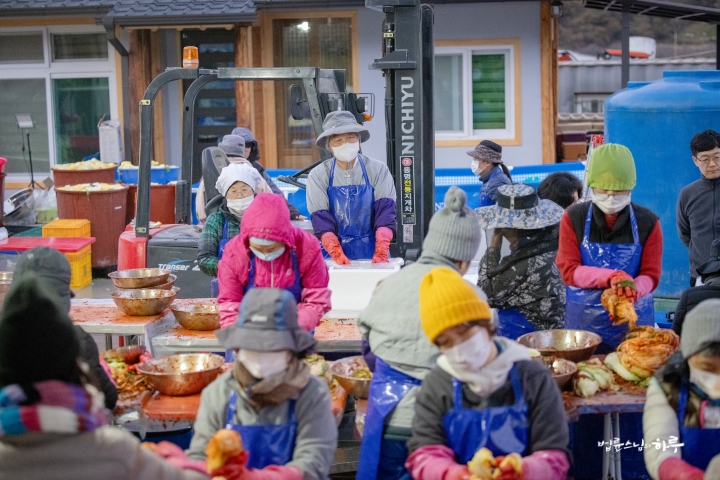
“Radish, please!”
“Yes, radish coming!”
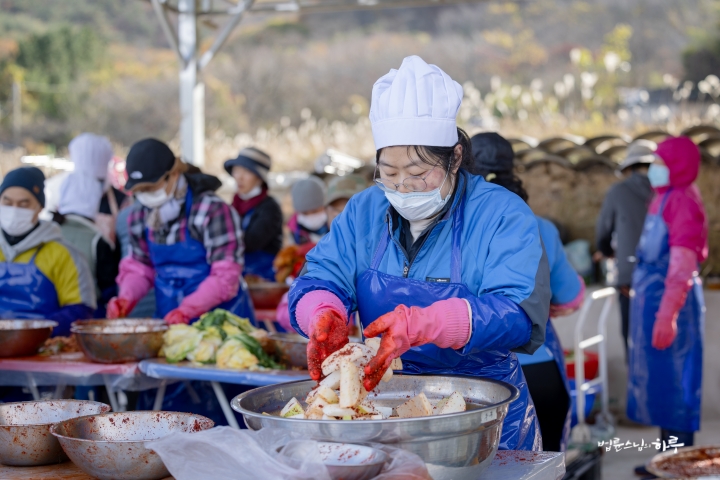
Sunim carefully packed the kimchi to make it easy for the recipients to eat. He arranged the root ends of the cabbage in alternating directions and placed the cut sides facing up to prevent the seasoning from spilling out. He also placed the less salted cabbage at the bottom and the well-salted cabbage on top so that the ripe kimchi could be eaten first.

After Sunim tightly packed the kimchi, the volunteers responsible for packaging moved the boxes, tied them with plastic, covered them with lids, and sealed them with tape. The kimchi boxes were stacked neatly.
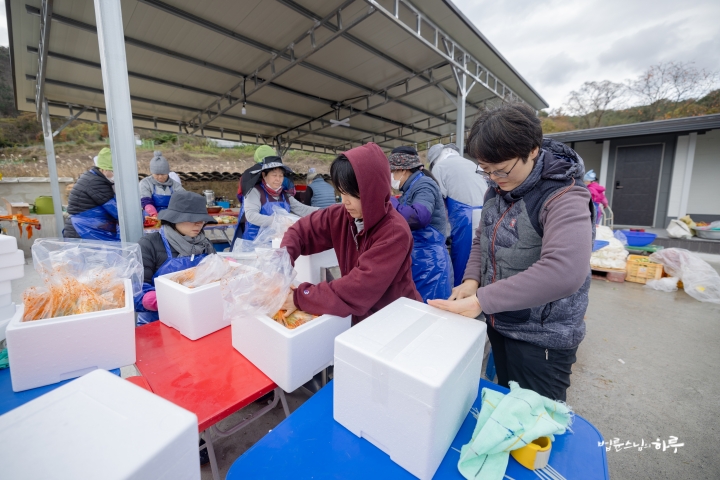

After working all afternoon, they finally completed 150 boxes of gift kimchi.
“Good job, everyone.”
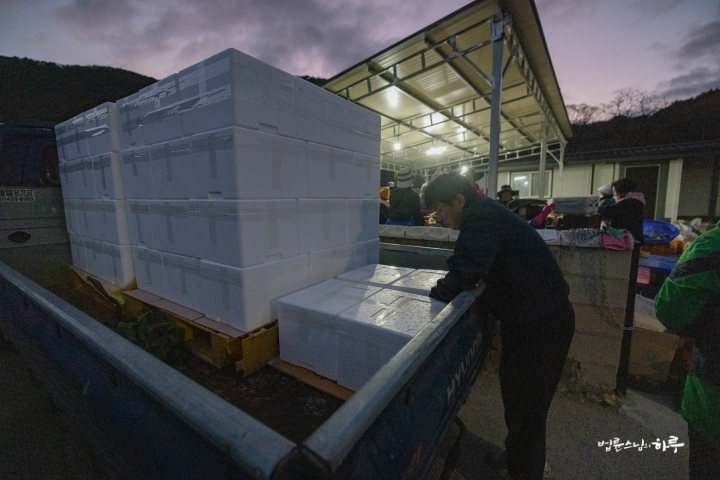

However, there was a lot of kimchi seasoning left over. Out of nine basins, only four were used, leaving five full. Last year, there was an emergency when they ran out of seasoning, but this year, after increasing the amount, they had too much left over.
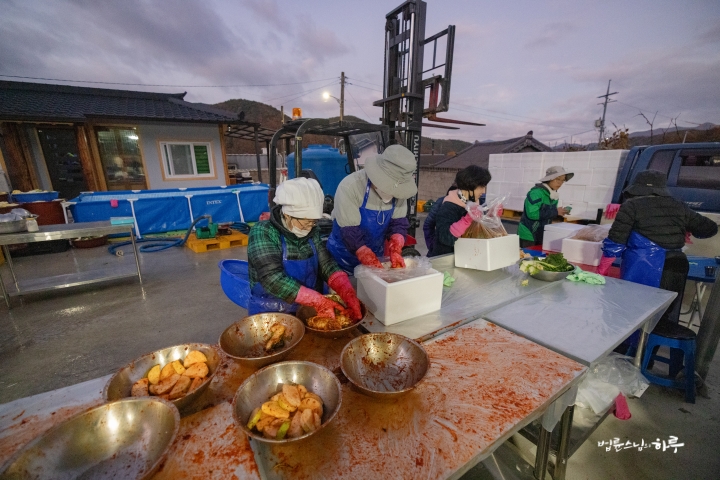
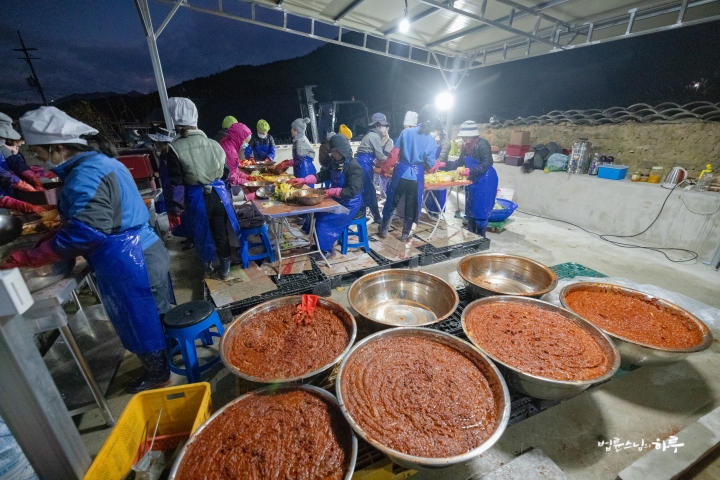
“Let’s continue working until we use up all the kimchi seasoning.”
They decided to mix all the remaining kimchi cabbage and kimchi seasoning, pack it into kimchi containers, and store it in a low-temperature refrigerator. As the sun set, they turned on the lights and restarted the kimchi factory.
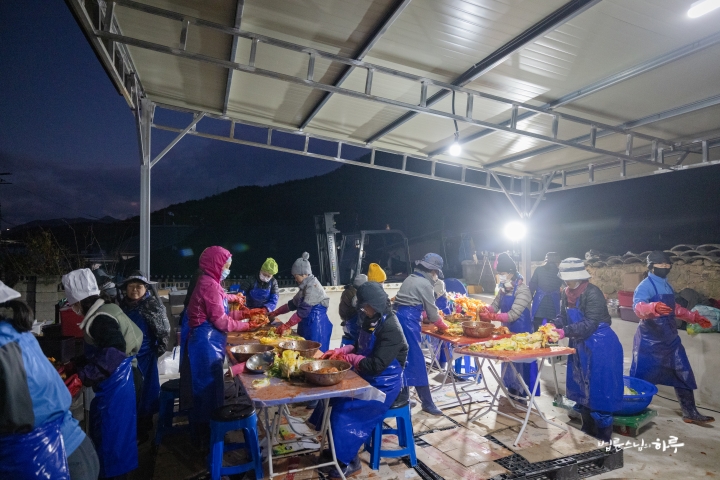
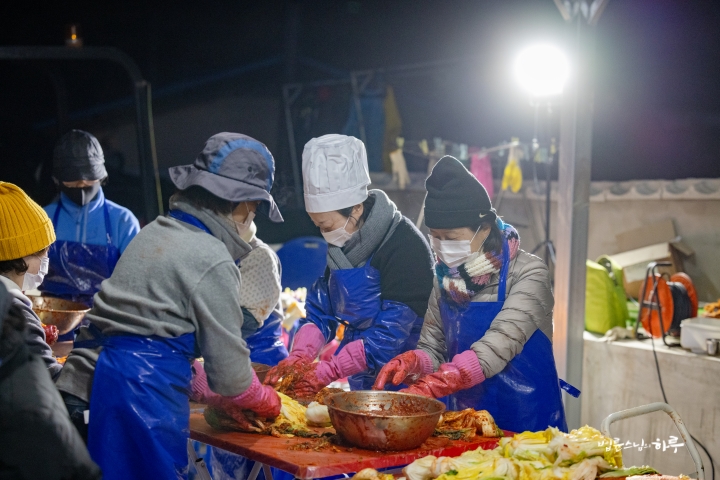
As it got dark, the temperature dropped rapidly. Sunim, who had been diligently packing kimchi into containers, called out.
“Let’s stop here for today. We’ll continue with the rest tomorrow.”
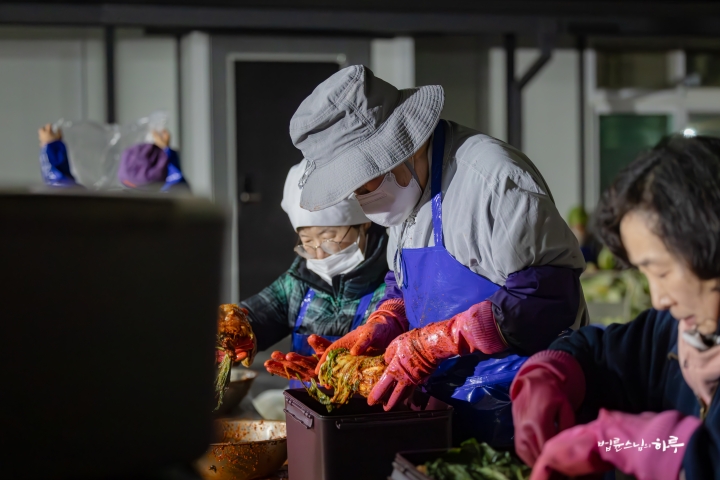
After having dinner together in the yard and cleaning up, they concluded the second day of Kimjang.
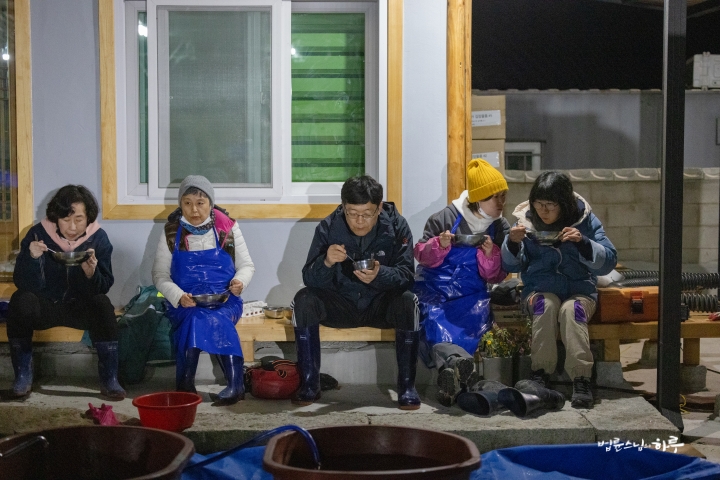
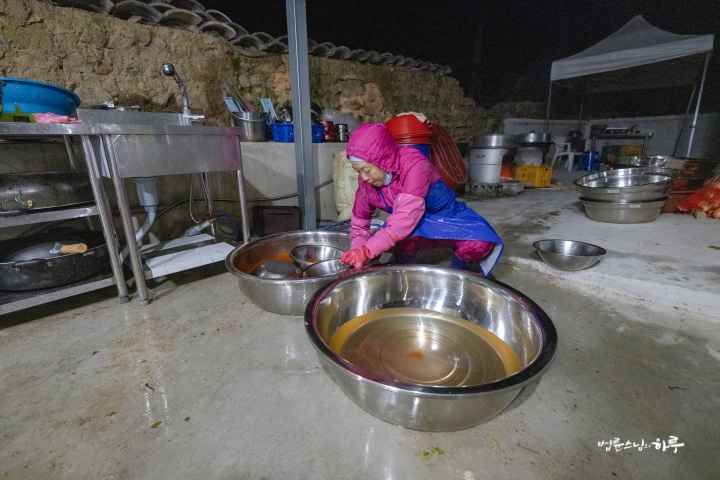
They returned to the Dubuk Jungto Retreat Center with tired bodies and fell into a deep sleep.

As there was no Dharma talk today, the article will be concluded by sharing the content from the Happy Dialogue Q&A session held in Jeonju on the 22nd.
My Father Says He Can Only Smile When I Get Married
“How old do you think I am?”
“I believe you’re in your 70s.”
“I’m seventy-two this year and I’m still not married, so how can I comment on someone who’s only thirty-five not being married? You should ask this question to someone who got married before they were thirty-five. They might be able to tell you ‘do this’ or ‘do that,’ but if you ask a monk who hasn’t married even after turning seventy, I would say, ‘You still have a long way to go. There’s no need to rush.’ (Laughs)
You’re actually using your father as an excuse. Wouldn’t it be more honest to say, ‘Now that I’m thirty-five, I want to get married, but I can’t find the right woman’? Instead, you’re using your father as an excuse and making it seem like you’re getting married to be filial. Your father has been telling you to get married for a long time, both in the past and now, but the fact that it’s bothering you more these days means that you yourself are thinking, ‘Should I get married now?’ Do you think I’ve heard my parents say ‘Quit being a monk and get married’ every time I’ve seen them throughout my life, or not?”
“I think you must have heard that.”
“Yes, I’ve heard such things too. But if I had quit being a monk then, there wouldn’t be the Venerable Pomnyun Sunim of today. In fact, when someone would say to my father that I was a great monk, he would reply, ‘What’s so great about someone who can’t even leave behind offspring? Even the insignificant grass by the roadside leaves its seeds, but what’s so great about a person who can’t even leave behind offspring?’ When someone listening to this said, ‘But Sunim has so many great disciples,’ my father retorted, ‘They’re all just chaff.’ ‘Chaff’ in the Gyeongsang dialect refers to empty rice husks without any grain inside. You might see me as a great monk with many great disciples around me, but in my parents’ eyes, none of that matters – the only important thing is whether their child has offspring or not. If you hear your father say such things and start thinking, ‘Am I really just chaff? Should I leave behind offspring too? Shouldn’t I be better than grass?’ is that because of your father? Or is it because you yourself want to get married?
Similarly, while I understand your background explanation, the fact that your father’s words are bothering you is evidence that you’ve been thinking a lot about marriage lately. Also, if you feel that way, you can just get married. There’s no need to use your father as an excuse. If you want to get married, just go ahead and do it.

If you want to get married but can’t find a woman you like, you should lower your standards. First, you need to lower your age expectations. You should consider an age difference of up to 20 years, either older or younger, as acceptable. It shouldn’t matter whether the person has been married before or not. President Trump’s wife is 25 years younger than him, while President Macron’s wife is 25 years older. Trump is remarried, and Macron’s wife is remarried. Moreover, Macron fell in love with his friend’s mother, who was also his teacher, and pursued her even after graduating high school until they eventually married. These days, there are various examples like this, and such people even become presidents. So, you should be open to an age difference of up to 20 years, either way. Don’t limit yourself to first marriages; be open to second or third marriages as well. Don’t worry about whether the person has two or three children. Don’t be concerned about height. First, you need to broaden your criteria for a potential partner. If you think “as long as it’s a woman,” your options will greatly expand.
If you start specifying requirements like height, age, education level, and appearance, you won’t be able to meet anyone. Many people say, “I’m not picky,” but when asked, they actually have many criteria. If you input all these conditions into an AI and ask, “Is there such a person among 8 billion people?” the answer will be “No.” So if you’re picky about everything, there won’t be a single person who meets all your criteria.
So to get married, you need to either deceive your partner a little or be deceived a little. If you’re 160 cm tall, you might say you’re 162 cm. That’s why people wear slightly higher shoes when going to meet someone. You put on makeup to slightly deceive about your appearance, maybe say you went to a community college if you only finished high school, or say you started graduate school if you only finished college – everyone deceives a little bit. When going on a date, you might borrow money to put some in your pocket. This is all about deceiving a little to date and to get married. But after marriage, what happens? You start to feel something’s not quite right. That’s normal because you both deceived each other a little during the process of getting married. But if you think about it, the marriage was possible because of these small deceptions. If you had known the whole truth from the beginning, the marriage might not have happened at all. So you should be grateful to the spouse who deceived you a little. It’s because of that deception that you were able to get married. (Laughter)
Since ancient times, it’s been said that matchmakers easily get slapped three times. This is because they slightly deceive both sides. If they don’t deceive both parties a little, the match won’t happen. Everyone wants to meet someone slightly better than themselves. Because everyone is looking slightly upward, the matchmaker exaggerates a bit to make the other party appealing. It’s not necessarily lying with bad intentions, but doing so because that’s how things get done.
If you lower your standards and still can’t find a partner among Koreans, you should broaden your search globally. If you think, “Chinese people are fine, Vietnamese people are fine, Filipino people are fine,” your chances of successful marriage increase. This should be your mindset if you want to get married. If you have no intention of getting married, like me, you can keep your standards high. But if you keep your standards high, the probability of staying single until death is high, so you shouldn’t regret your choice. It’s up to you to choose between these two options.
“Thank you.”
“First, stop making excuses about your father and be honest with yourself. Your father is living his own life, so don’t use him as an excuse. You should decide for yourself what you want to choose.”
“Are you saying I should get married without being picky, Sunim?”
“No, that’s not what I’m saying. I’m saying if you want to get married, that’s what you should do. How can you get married if you’re picky about everything? So unless you’re not going to get married at all, if you want to get married, you need to lower your standards.”
“Then I should lower my standards a little from now on.”
“A little won’t do, you need to lower them a lot.” (Laughter)
“Are you saying I should just get married well without being picky, even if the other person has some flaws?”
“What do you mean by ‘get married well’? You just get married. Think about your own situation. What makes you so great that you’re trying to ‘get married well’? Just think, ‘As long as I get married, that’s enough.'” (Laughter)
“When looking for a partner, we don’t just meet anyone. If I’m a decent person, I naturally want the other person to be good too.”
“What makes you think you’re such a decent person?”
“If I were a decent person, I mean. Also, if we want to know about the other person, we need to meet seriously, which takes time, doesn’t it?”
“That also depends on the person. Some people get married after meeting for just one day, and some people get married reluctantly. When I became a monk, it was reluctant too. I had no desire to become a monk at all, but I ended up becoming one. And look, I’m living well like this.

In Mongolia, there’s a culture of so-called ‘marriage by abduction.’ A man goes with his friends on horseback to another village, kidnaps a woman he likes, and brings her back. Then the woman’s brothers or relatives chase after them to rescue her. If they’re caught midway, the man might lose his life, but if they manage to reach home without being caught, they get married. Once married that way, that’s the end of it. They don’t cancel the marriage just because it happened like that. That’s the marriage culture in that region. In our country too, people used to get married without even seeing each other’s faces, just based on matchmaking. In China, parents would arrange marriages even before the babies were born. So, you can get married without seeing each other’s faces, or after seeing each other once, or like nowadays, after dating for 10 years. Even after living together for 3 years before marriage, some people still divorce after a year. It’s different for everyone and every culture, so we can’t say there’s one right way to do it.
Looking at how much you think about this, it seems it won’t be easy for you to get married. To get married, you need to think, ‘As long as it’s a woman, that’s fine.’ If you’re going to be picky like you are now, it’s better to stay single like me. The more picky you are in getting married, the worse decision you’re likely to make. There are many people here in this lecture hall who have metaphorically poked out their own eyes. (Laughter)

If you’re too picky about marriage, it often leads to failure. Why is that? Is it because you chose the wrong person? Not necessarily. Being overly selective means you have high expectations. As a result, when faced with reality, the disappointment is also great. This is actually due to your own expectations, but when things don’t work out, you might think, ‘I was too choosy and ended up picking the wrong person.’ In reality, it’s not that you made a bad choice, but rather that your expectations were too high. The longer you hesitate, the higher your expectations become.”
“Yes, I understand. Thank you.”
Tomorrow is the third day of kimchi-making. In the morning, work will continue until the remaining cabbage and kimchi seasoning are used up. In the afternoon, after cleaning up, there will be time for conversation with Sunim before concluding the three-day kimchi-making community effort.




